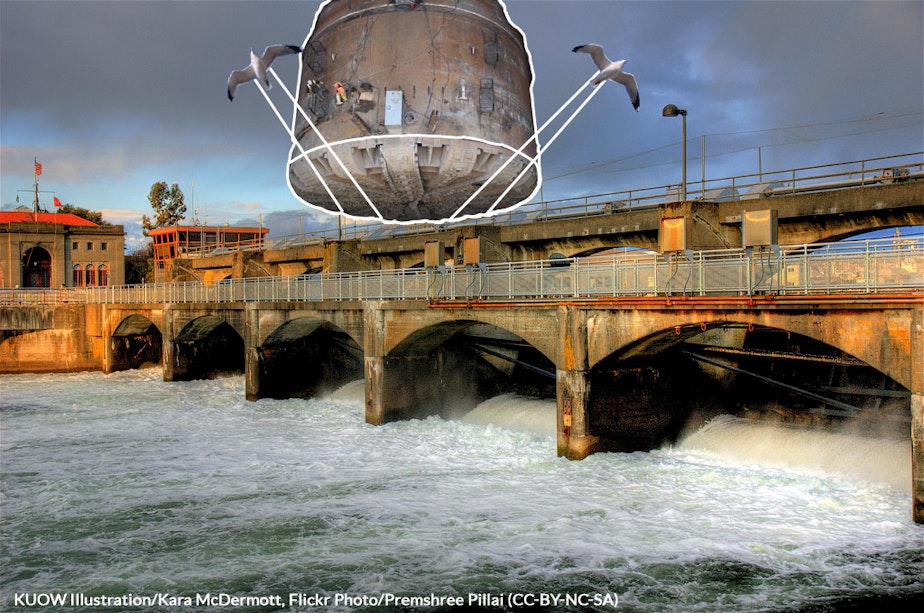Could Seattle's Bertha Deliver Salmon Salvation?

The tunneling machine known as Bertha has been stuck beneath the Seattle waterfront since December 2013, stalling construction and racking up millions in cost overruns.
One local engineering firm has a fresh idea for the fumbling tunneling project: Instead of moving Subarus through the heart of the city, the tunnel should be used by salmon.
“What we’ve found is the leftover tunnel could be an outstanding, if not the perfect, conduit to help our coho friends make their way from Puget Sound into Lake Union,” said Don Meadows, lead engineer at Seattle-based Subterranean Design Group.
Right now, the salmon that return to Lake Union to spawn must navigate the fish ladder at the Ballard Locks. That facility was built more than 100 years ago, and Meadows says his fish tunnel will incorporate the latest salmon transport technology.
“There’ll be some large turbine fans which will push the fish along at a higher rate than they’re used to but it’s dark and they’re not used to that level of light and low oxygen so they need to move quickly,” Meadows said.
Sponsored
Subterranean Design Group projects 10 to 25 percent of the salmon that utilize the tunnel will survive the journey.
But fisheries managers are divided on the idea. Chris Sergeant, a biologist with the Portage Bay Science Institute, points out that hydropower engineers have found creative ways to get salmon around dams for decades using trucks, ladders and even a device called the salmon cannon. Why not a tunnel?
“I don’t want to say definitively, but it would cut miles off their travel,” Sergeant said. “It’s a straight shot, and if they can get in the lake faster that’s bound to help some of these threatened stocks.”
Sergeant cautioned that the tunnel would need to be designed with side channels to serve as resting areas for the migrating fish. But he says it’s worth the gamble. Salmon are struggling to survive in the increasingly urbanized Puget Sound region.
“It’s a pretty crazy idea but it might be something that works,” he added. “Big problems require big solutions and maybe this is the next thing.”
Sponsored
Atlantic salmon runs improved once engineers on Boston’s Big Dig implemented a similar salmon tunnel system.
But the proposal is drawing harsh criticism from local environmentalists. Susan Miller is with Puget Sound Policy Watch.
“This won’t work as an environmental alternative. Salmon will not swim in this tunnel. The salmon are smarter than we are,” said Miller, the organization’s director.
Miller says a tunnel that was designed for cars will never work for fish.
“How are the salmon going to know to swim through the tunnel? Are we putting in an electric sidewalk? ‘Get off here, turn right at the bend, salmon? Use the Northgate exit?’ These salmon are not swimming through the tunnel,” she said.
Sponsored
Puget Sound Policy Watch and several other environmental groups have filed a lawsuit to prevent the proposed salmon tunnel from going forward.
Don Meadows says their opposition is misguided and his firm is committed to improving salmon migration through Seattle.
“This is going to be a revolutionary step forward in salmon evolution and we want to be on the forefront of adapting salmon to an urban environment,” Meadows said, smiling. “This has never been done before, it may never be done again, we’re hoping for good things. But salmon are gonna be as common as pigeons in this town.”
Happy April Fool’s Day.
